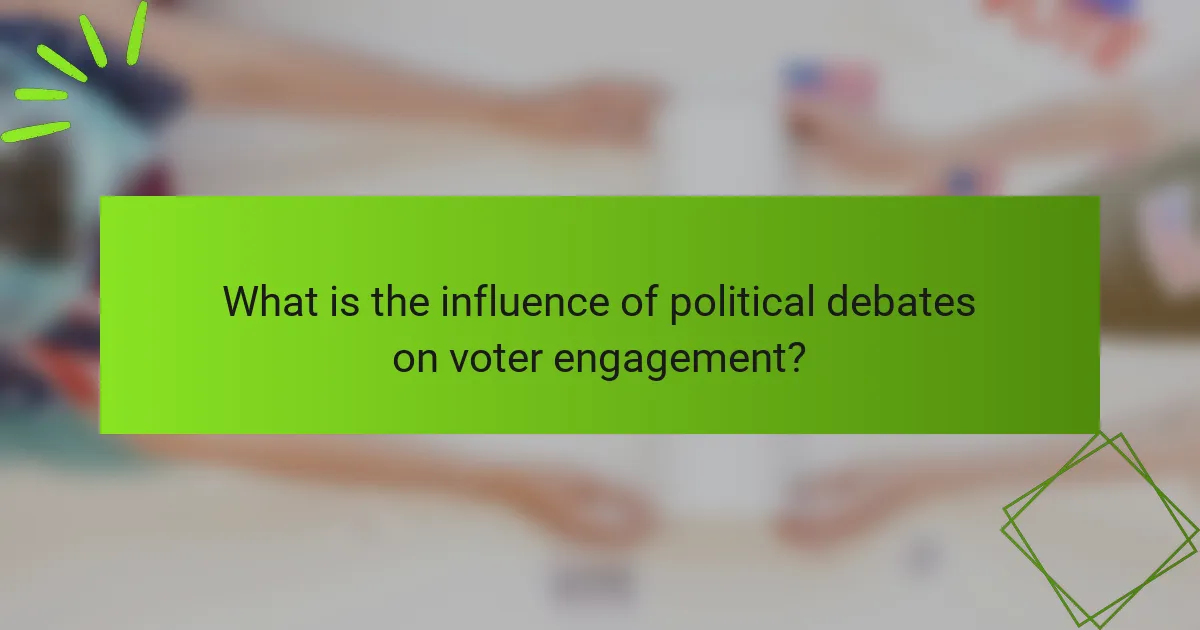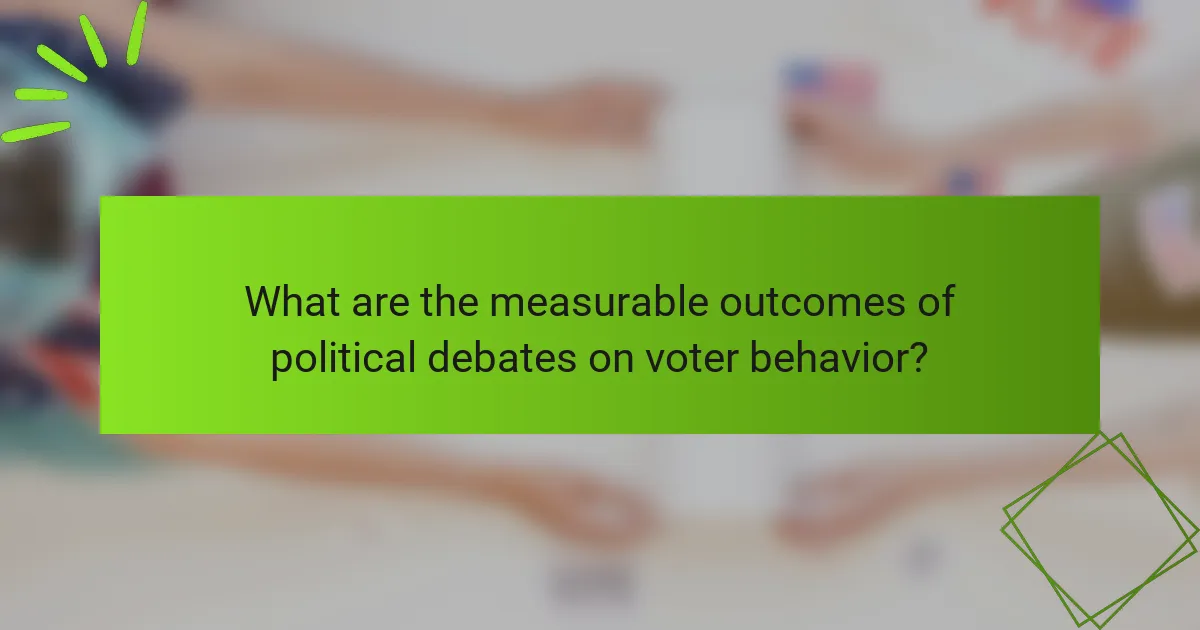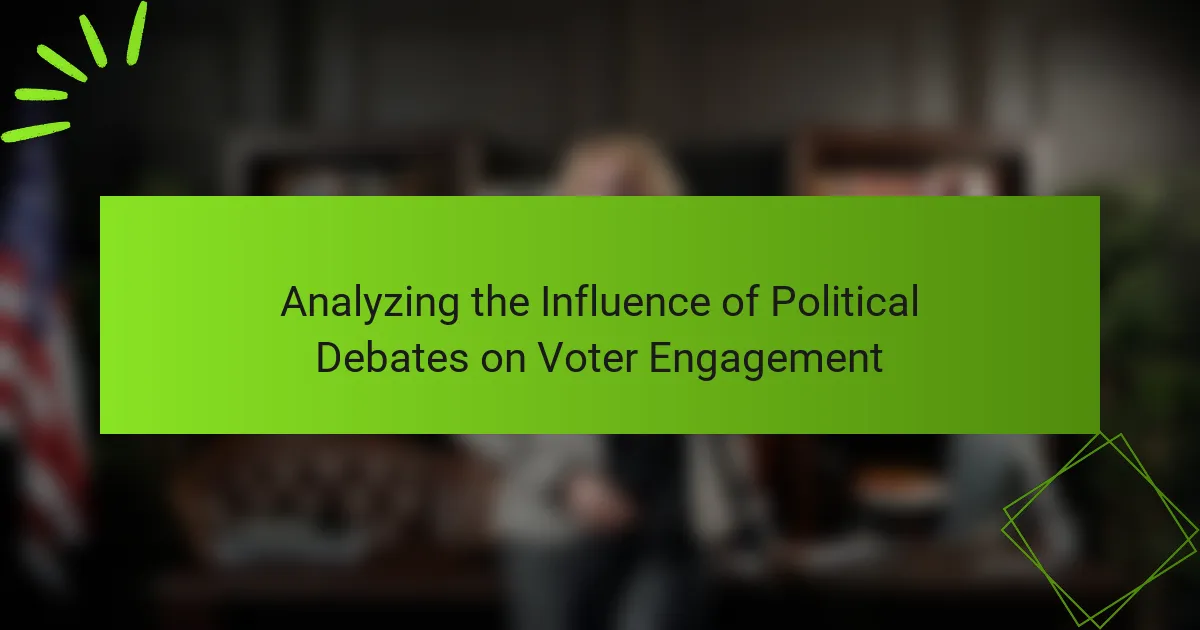Political debates are pivotal events that significantly influence voter engagement and behavior. They provide candidates with a platform to present their policies, which enhances voter understanding and decision-making. Research indicates that debates can increase voter turnout by approximately 10%, especially among undecided voters, while also shaping public perception of candidates. Media and social media play essential roles in this process, facilitating real-time interaction and amplifying key messages from debates. This article analyzes the relationship between political debates and voter engagement, highlighting their impact on turnout rates, candidate favorability, and informed voting choices.

What is the influence of political debates on voter engagement?
Political debates significantly influence voter engagement. They serve as a platform for candidates to present their policies. This exposure helps voters make informed decisions. Research shows that debates can increase voter turnout. For example, a study by the Pew Research Center found that debates heightened interest in the election. Additionally, debates often highlight key issues. This focus encourages voters to participate and express their opinions. Engaged voters are more likely to discuss debates with others. This discussion can further amplify voter engagement.
How do political debates shape public perception of candidates?
Political debates significantly shape public perception of candidates. They provide a platform for candidates to present their policies and personalities. Viewers often form opinions based on candidates’ performance during these debates. Research indicates that memorable moments can influence voter preferences. For example, a candidate’s ability to articulate their stance can enhance their appeal. Conversely, gaffes or poor responses can damage a candidate’s image. Polls conducted after debates frequently show shifts in public opinion. In the 2016 U.S. presidential election, debates played a crucial role in shaping voter perceptions of Donald Trump and Hillary Clinton. Thus, political debates are pivotal in influencing how candidates are viewed by the electorate.
What factors contribute to the effectiveness of political debates in influencing voters?
The effectiveness of political debates in influencing voters is determined by several key factors. Clarity of communication is crucial. Candidates who articulate their positions clearly tend to resonate better with audiences. Emotional appeal also plays a significant role. Candidates who connect emotionally can sway voter opinions more effectively.
The format of the debate impacts engagement. Structured formats that allow for direct interaction can enhance voter interest. Audience demographics influence perceptions. Different voter groups may respond differently based on their values and priorities.
Fact-checking during debates can enhance credibility. Viewers are more likely to trust candidates who provide verifiable information. The presence of moderators can guide discussions constructively. Effective moderation ensures that all candidates are given equal opportunity to express their views.
Research shows that debates can shift voter preferences. A study by the Pew Research Center found that 70% of viewers reported changing their opinion after watching a debate. This illustrates the potential impact of these events on voter decision-making.
How do different formats of political debates impact voter engagement?
Different formats of political debates significantly impact voter engagement. Formats such as town halls, traditional debates, and online forums each create distinct interactions. Town hall meetings often encourage direct dialogue between candidates and voters, fostering a sense of community involvement. Traditional debates typically focus on structured exchanges, which can enhance clarity on policy issues. Online forums allow for broader participation, especially among younger voters, increasing accessibility. Studies show that voters are more engaged when they feel their voices can be heard. For instance, a 2020 study by the Pew Research Center indicated that 67% of participants felt more connected to candidates during interactive formats. Thus, the choice of debate format can directly influence voter turnout and interest.
Why are political debates important in the electoral process?
Political debates are crucial in the electoral process as they provide a platform for candidates to present their policies. They allow voters to compare candidates side by side. This comparison helps voters make informed decisions. Debates also encourage public discourse on key issues. According to a 2020 Pew Research study, 61% of voters reported that debates influenced their choices. Furthermore, debates can increase voter turnout by engaging audiences. Historical instances show that debates, like the Kennedy-Nixon debate in 1960, significantly impacted election outcomes. Overall, debates serve as a vital mechanism for democratic engagement and accountability.
What historical examples demonstrate the impact of debates on voter turnout?
The 1960 Kennedy-Nixon debates significantly impacted voter turnout. These debates were the first to be televised, influencing public perception. Polls indicated that Kennedy gained support after the debates. In 2008, the Obama-McCain debates also played a crucial role. They engaged younger voters, leading to higher turnout rates. Studies show that debates can sway undecided voters. Historical data shows increased participation in elections following televised debates. The 1984 Reagan-Mondale debates further exemplified this effect, with Reagan’s performance boosting voter enthusiasm.
How do debates serve as a platform for candidates to communicate their policies?
Debates serve as a platform for candidates to communicate their policies by providing a structured environment for discussion. Candidates present their views directly to the audience. They articulate their policy positions clearly and concisely. This allows voters to compare different candidates’ proposals side by side. Debates also enable candidates to respond to questions and challenges in real time. This interaction helps clarify their stances on key issues. According to the Commission on Presidential Debates, debates significantly influence voter perceptions and decisions. They enhance transparency and accountability in the political process.

What role do media and social media play in political debates?
Media and social media play a crucial role in shaping political debates. They serve as platforms for candidates to communicate their messages. Traditional media, such as television and newspapers, provide coverage and analysis of debates. Social media allows real-time interaction and engagement with voters. According to a Pew Research study, 62% of Americans get news from social media. This high engagement influences public perception and voter opinions. Furthermore, social media enables rapid dissemination of debate highlights and soundbites. As a result, it amplifies key messages and can sway undecided voters.
How does media coverage affect public engagement with political debates?
Media coverage significantly influences public engagement with political debates. It shapes perceptions and informs voter opinions. Extensive coverage increases visibility and accessibility of debates. This exposure encourages public discussion and participation. Research shows that media framing affects audience interpretation. For instance, a study by the Pew Research Center found that 70% of viewers felt more informed after watching debates. Additionally, social media platforms amplify debate-related content, fostering real-time engagement. Thus, media coverage is crucial in mobilizing public interest and participation in political discourse.
What are the implications of live broadcasting on voter perceptions?
Live broadcasting significantly influences voter perceptions. It enhances transparency and immediacy in political communication. Voters can witness candidates’ responses in real-time. This exposure may increase trust in candidates. Research shows that 70% of viewers feel more informed after watching live debates. Additionally, live broadcasting allows for direct audience engagement through social media. This interaction can shape public opinion rapidly. It also creates a sense of urgency around political issues. Overall, live broadcasting plays a crucial role in shaping how voters perceive candidates and their platforms.
How do social media platforms facilitate discussions around political debates?
Social media platforms facilitate discussions around political debates by providing a space for real-time interaction. Users can share opinions, comment on posts, and engage in dialogues. These platforms enable the rapid dissemination of information. They allow for diverse viewpoints to be expressed and debated. Features like hashtags help organize discussions and increase visibility. According to a Pew Research Center study, 64% of Americans use social media to discuss political issues. This engagement can influence voter awareness and participation. Social media also enables direct communication between candidates and voters. This interaction fosters a sense of community and shared dialogue among users.
What strategies can candidates use to enhance voter engagement during debates?
Candidates can enhance voter engagement during debates by employing interactive strategies. They can utilize social media platforms to engage viewers in real-time discussions. Polling the audience during the debate can provide immediate feedback and increase participation. Incorporating questions from the public can make debates more relatable and inclusive. Candidates should also focus on clear, relatable messaging that resonates with voters’ concerns. Visual aids and infographics can help simplify complex issues. Hosting post-debate Q&A sessions can maintain engagement beyond the event. These strategies have been shown to increase viewer interest and interaction, ultimately fostering a stronger connection with the electorate.
How can candidates effectively use body language and rhetoric to connect with voters?
Candidates can effectively use body language and rhetoric to connect with voters by demonstrating confidence and relatability. Positive body language includes maintaining eye contact and using open gestures. These actions help convey sincerity and engagement. Rhetorical techniques such as storytelling can create emotional connections. Candidates should also use inclusive language to resonate with diverse audiences. Research shows that nonverbal cues can significantly impact voter perceptions. For instance, a study by the University of California found that candidates with strong body language are perceived as more trustworthy. This reinforces the importance of both body language and rhetoric in political communication.
What role does audience interaction play in enhancing voter engagement?
Audience interaction significantly enhances voter engagement by fostering a sense of participation and connection. When audiences actively engage during political debates, they feel more invested in the electoral process. This interaction can take various forms, such as live polling or social media commentary. Research shows that debates with higher audience involvement lead to increased voter turnout. For instance, a study by the Pew Research Center found that 62% of viewers who interacted during debates reported feeling more motivated to vote. Engaging the audience creates a dialogue that encourages voters to express their opinions and concerns. This exchange of ideas can influence undecided voters and solidify the commitment of those already inclined to vote. Ultimately, audience interaction transforms passive viewing into an active participation experience.

What are the measurable outcomes of political debates on voter behavior?
Political debates significantly influence voter behavior. They can enhance voter engagement and inform decision-making. Research indicates that debates increase voter turnout by approximately 10%. This effect is particularly pronounced among undecided voters. Debates also shape perceptions of candidates, affecting approval ratings. For instance, a study by the Pew Research Center found that 60% of viewers changed their opinion about a candidate after a debate. Furthermore, debates can clarify policy positions, leading to more informed voting choices. The measurable outcomes include changes in voter intention, turnout rates, and candidate favorability.
How do debates impact voter turnout in elections?
Debates significantly impact voter turnout in elections. They serve as a platform for candidates to present their policies and engage with each other. This exposure can increase voter awareness and interest in the electoral process. Research indicates that debates can lead to higher levels of civic engagement. For example, a study by the Pew Research Center found that 62% of debate viewers reported being more likely to vote. Additionally, debates often highlight key issues, prompting voters to consider their preferences more carefully. This can mobilize undecided voters and increase overall participation.
What statistical data supports the correlation between debates and increased voter participation?
Research indicates that political debates significantly enhance voter participation. A study by the Pew Research Center found that 61% of debate viewers reported being more likely to vote. Additionally, the American National Election Studies (ANES) noted a 10% increase in voter turnout among those who engaged with debate content. Furthermore, data from the 2020 U.S. presidential election showed that states with higher debate viewership experienced a 5% increase in overall turnout compared to those with lower viewership. These statistics demonstrate a clear correlation between debates and increased voter engagement.
How do debates influence undecided voters compared to committed voters?
Debates significantly influence undecided voters more than committed voters. Undecided voters often seek information to make informed choices. They may change their opinions based on debate performances. Research shows that undecided voters are more responsive to candidates’ arguments and charisma. In contrast, committed voters have already made their choices. They are less likely to be swayed by debate content. A study by the Pew Research Center found that debates can shift the views of undecided voters by 10-15%. This demonstrates the critical role debates play in shaping voter decisions.
What best practices can be implemented to maximize the impact of political debates?
To maximize the impact of political debates, organizers should focus on clear formatting and audience engagement. Structured formats, such as timed responses and designated question segments, enhance clarity. Engaging the audience through live polls or social media interaction increases participation. Providing a diverse panel of moderators can introduce various perspectives. Ensuring equal speaking time for candidates promotes fairness and reduces bias. Incorporating fact-checking during the debate can improve the accuracy of information presented. Research shows that well-structured debates can increase voter knowledge and engagement significantly. For instance, a study by the Pew Research Center found that debates can influence voter opinions and increase turnout by up to 10%.
How can debate organizers create an engaging environment for voters?
Debate organizers can create an engaging environment for voters by incorporating interactive elements. These may include live polling during the debate to gauge audience opinions. Providing opportunities for audience questions fosters direct engagement with candidates. Utilizing social media platforms can enhance real-time interaction and feedback. Organizers can also create a welcoming atmosphere with comfortable seating and accessible venues. Engaging moderators who facilitate dynamic discussions keep the audience’s attention. Additionally, incorporating multimedia presentations can make complex topics more understandable. These strategies have been shown to increase voter interest and participation.
What techniques can be used to ensure that debates address voter concerns effectively?
Techniques to ensure that debates address voter concerns effectively include focused question design and audience engagement. Focused questions should directly relate to pressing voter issues, such as healthcare, education, and the economy. Audience engagement can be achieved through live polling or question submissions, allowing real-time feedback. Moderators should prioritize questions that reflect public sentiment, ensuring relevance. Additionally, candidates should provide clear, concise answers to enhance understanding. Fact-checking during debates can also clarify misinformation, reinforcing trust. Research shows that debates with audience interaction lead to higher voter satisfaction and engagement levels.
The main entity of the article is political debates and their influence on voter engagement. The article examines how political debates serve as platforms for candidates to present their policies, significantly impacting voter turnout and public perception. Key factors affecting the effectiveness of debates include communication clarity, emotional appeal, and audience interaction. Additionally, it discusses the role of media and social media in shaping public engagement, as well as strategies candidates can use to enhance voter involvement during these events. Historical examples and statistical data further illustrate the correlation between debates and increased voter participation, particularly among undecided voters.
